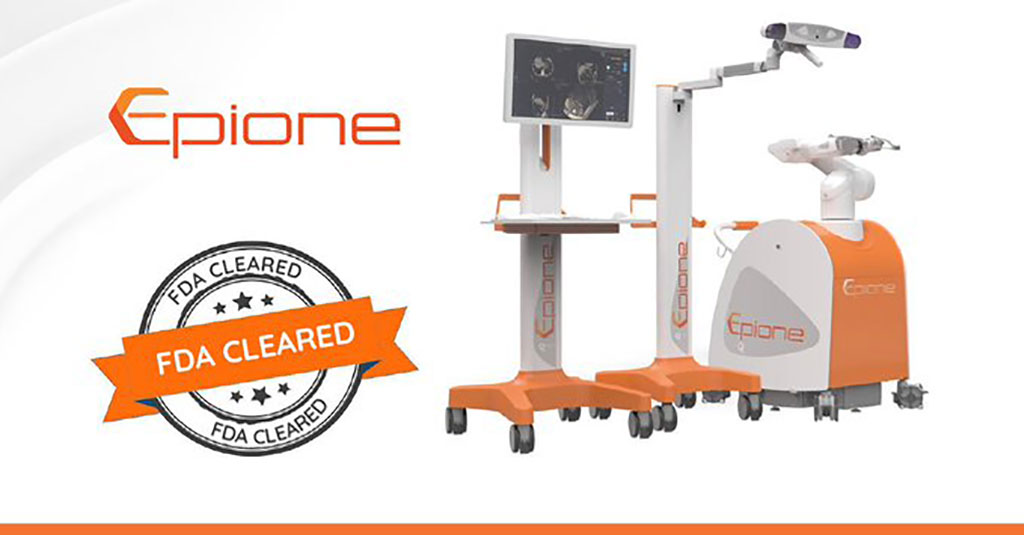Medical Robot Performs Minimally Invasive Liver Cancer Treatment
|
By HospiMedica International staff writers Posted on 01 Apr 2022 |

Liver cancer is one of the leading causes of cancer deaths globally with more than three million people diagnosed with liver disease each year throughout the world. Now, a unique robotic-assisted technology dedicated to minimally invasive liver cancer treatment enables physicians to plan, target, deliver and confirm tumor ablation.
Quantum Surgical’s (Montpellier, France) Epione is the only all-in-one robotic-assisted solution that provides multimodal preplanning, robotic guidance and ablation confirmation. Epione is designed to assist physicians plan, guide, and assess percutaneous ablation of tumors in the abdomen, a minimally invasive treatment in which a needle is inserted through the skin to the tumor to destroy it. Using the power of robotics and image fusion technology, Epione aims to provide clinicians with the ability to reach targeted tumors consistently.
The Epionen open robotic solution is compatible with any imaging systems. The medical robot is designed to allow physicians their choice of any ablative technologies (radiofrequency, microwave, cryoablation, irreversible electroporation) so they can decide the right therapy for each individual patient. It aims to dramatically ease multiple probe procedures which will make treatment of large tumors more predictable. Epione is the only interventional oncology robot that offers six degrees of freedom and unprecedented dexterity to access difficult trajectories when targeting abdominal tumors.
Following a successful multi-center clinical study completed in 2021, Epione received the CE mark approval and has also been granted the US Food and Drug Administration (FDA) 510(k) clearance, facilitating treatment of early-stage liver disease. The company plans to extend indications for the Epione platform to other organs and is developing artificial intelligence-based decision-support features.
“This clearance enables interventional oncologists to access state-of-the-art technology that has the potential to improve clinical outcomes and patient’s lives. We believe that the clinical adoption of innovative robotic solutions like Epione will be a significant step toward allowing more patients to benefit from minimally invasive therapies in cancer treatment,” said Bertin Nahum, President and Co-Founder of Quantum Surgical.
“Percutaneous tumor ablation is a proven therapy that is underutilized today, and Epione will allow expansion of this minimally invasive treatment to more patients battling liver cancer,” said Nishita Kothary, Professor of Radiology at Stanford University Medical Center.
“Epione introduces an exciting new era by expanding technical ability and safety in the diagnosis and treatment of lesions anywhere in the liver,” added Prof. Steven Colquhoun, Liver Transplant Surgeon, who specializes in robotic surgery at Cedars-Sinai Medical Center.
Related Links:
Quantum Surgical
Latest Surgical Techniques News
- Intravascular Imaging for Guiding Stent Implantation Ensures Safer Stenting Procedures
- World's First AI Surgical Guidance Platform Allows Surgeons to Measure Success in Real-Time
- AI-Generated Synthetic Scarred Hearts Aid Atrial Fibrillation Treatment
- New Class of Bioadhesives to Connect Human Tissues to Long-Term Medical Implants
- New Transcatheter Valve Found Safe and Effective for Treating Aortic Regurgitation
- Minimally Invasive Valve Repair Reduces Hospitalizations in Severe Tricuspid Regurgitation Patients
- Tiny Robotic Tools Powered by Magnetic Fields to Enable Minimally Invasive Brain Surgery
- Magnetic Tweezers Make Robotic Surgery Safer and More Precise
- AI-Powered Surgical Planning Tool Improves Pre-Op Planning
- Novel Sensing System Restores Missing Sense of Touch in Minimally Invasive Surgery
- Headset-Based AR Navigation System Improves EVD Placement
- Higher Electrode Density Improves Epilepsy Surgery by Pinpointing Where Seizures Begin
- Open-Source Tool Optimizes Placement of Visual Brain Implants
- Easy-To-Apply Gel Could Prevent Formation of Post-Surgical Abdominal Adhesions
- Groundbreaking Leadless Pacemaker to Prevent Invasive Surgeries for Children
- Spectroscopy Technique Improves Surgery for Pediatric Epilepsy Patients
Channels
Critical Care
view channel
Ingestible Smart Capsule for Chemical Sensing in the Gut Moves Closer to Market
Intestinal gases are associated with several health conditions, including colon cancer, irritable bowel syndrome, and inflammatory bowel disease, and they have the potential to serve as crucial biomarkers... Read moreNovel Cannula Delivery System Enables Targeted Delivery of Imaging Agents and Drugs
Multiphoton microscopy has become an invaluable tool in neuroscience, allowing researchers to observe brain activity in real time with high-resolution imaging. A crucial aspect of many multiphoton microscopy... Read more
Novel Intrabronchial Method Delivers Cell Therapies in Critically Ill Patients on External Lung Support
Until now, administering cell therapies to patients on extracorporeal membrane oxygenation (ECMO)—a life-support system typically used for severe lung failure—has been nearly impossible.... Read morePatient Care
view channel
Portable Biosensor Platform to Reduce Hospital-Acquired Infections
Approximately 4 million patients in the European Union acquire healthcare-associated infections (HAIs) or nosocomial infections each year, with around 37,000 deaths directly resulting from these infections,... Read moreFirst-Of-Its-Kind Portable Germicidal Light Technology Disinfects High-Touch Clinical Surfaces in Seconds
Reducing healthcare-acquired infections (HAIs) remains a pressing issue within global healthcare systems. In the United States alone, 1.7 million patients contract HAIs annually, leading to approximately... Read more
Surgical Capacity Optimization Solution Helps Hospitals Boost OR Utilization
An innovative solution has the capability to transform surgical capacity utilization by targeting the root cause of surgical block time inefficiencies. Fujitsu Limited’s (Tokyo, Japan) Surgical Capacity... Read more
Game-Changing Innovation in Surgical Instrument Sterilization Significantly Improves OR Throughput
A groundbreaking innovation enables hospitals to significantly improve instrument processing time and throughput in operating rooms (ORs) and sterile processing departments. Turbett Surgical, Inc.... Read moreHealth IT
view channel
Printable Molecule-Selective Nanoparticles Enable Mass Production of Wearable Biosensors
The future of medicine is likely to focus on the personalization of healthcare—understanding exactly what an individual requires and delivering the appropriate combination of nutrients, metabolites, and... Read more
Smartwatches Could Detect Congestive Heart Failure
Diagnosing congestive heart failure (CHF) typically requires expensive and time-consuming imaging techniques like echocardiography, also known as cardiac ultrasound. Previously, detecting CHF by analyzing... Read moreBusiness
view channel
Expanded Collaboration to Transform OR Technology Through AI and Automation
The expansion of an existing collaboration between three leading companies aims to develop artificial intelligence (AI)-driven solutions for smart operating rooms with sophisticated monitoring and automation.... Read more
















